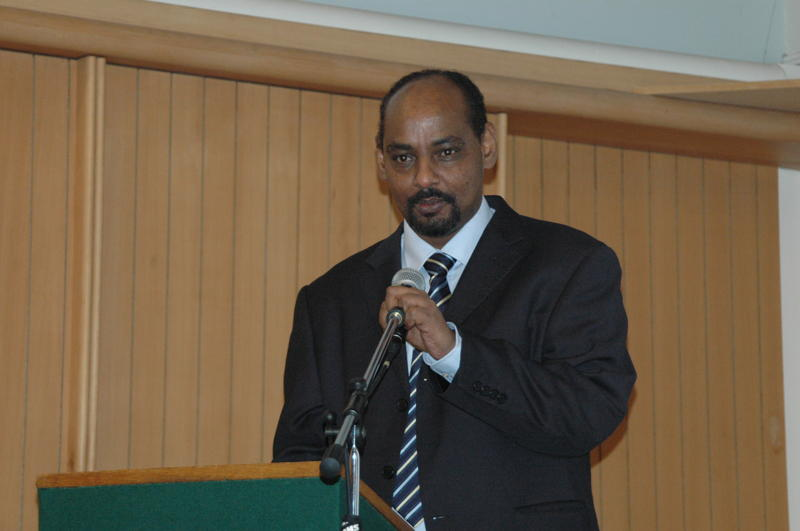
Human rights defender's story: Suleiman Hussein from Eritrea
Suleiman Hussein, a dedicated Eritrean human rights defender and chairman of CDRiE, tirelessly advocates for democracy and human rights in Eritrea, a nation plagued by political repression and human rights violations.
Suleiman Hussein is an Eritrean human rights defender, and chairman of Citizens for Democratic Rights in Eritrea (CDRiE). Suleiman grew up during his country’s 30-year struggle for independence and subsequently felt the frustration of many Eritreans when the new transitional Government failed to fulfil its promise of freedom for its people. Twenty-three years later, Eritrea is still ruled by the same transitional Government and there is no constitution, whilst the rule of law is non-existent. CDRiE is born out of the frustration of the Eritrean people. It came into existence five years ago when Suleiman and other like-minded individuals joined together to discuss the deteriorating conditions in the country and to explore more effective ways to contribute to the ongoing struggle for democratic change.
“Today Eritrea ranks among the top refugee exporters in the world as its citizens leave the country in their thousands to escape political repression and human rights violations.”
The Eritrean Government has continued to make life difficult for Eritreans inside the country whilst its foreign policies have isolated Eritrea internationally, Suleiman explains. Eritrea has been independent for only two decades, the past five of which it has been under UN sanctions.
CDRiE is part of the Eritrean people’s efforts for democracy and strives to support the pro-democracy forces inside the country in any way possible. While the organisation has its headquarters in London it is not limited to London and has members in other democratic countries. CDRiE’s position outside Eritrea enables it to bypass the censorship within the country and voice the troubles of Eritrean people, exposing the gross human rights violations taking place within Eritrea.
“It is amazing how time flies. Five years ago no one thought the situation in Eritrea would remain the same, but here we are.”
During the long years of armed struggle for independence, there was a prevailing culture of violence that contributed to the establishment of dictatorship in post-independence Eritrea. Today, CDRiE counters that culture of violence by pursuing nonviolent means of struggle for democracy. Despite its limited resources, the organisation has significantly strengthened its internal organisational structure and has built strong network of working relationships with many Eritrean and non-Eritrean organisations.
Recently, CDRiE partnered with World Alliance for Citizen Participation (CIVICUS) to take part in the 2013 United Nations’ Universal Periodic Review (UPR).
CDRiE’s submission to the UPR raises concerns over Eritrean State agents’ direct involvement in harassing, threatening, and attacking civil society activists and human rights defenders. Additionally, it protests against the Eritrean Government’s continued censorship of already limited internet access in the country, and the persistent practice of arbitrarily arresting and detaining journalists.
“Censoring and arbitrary arrests are not signs of the Eritrean Government’s strength. If anything, they show that people in Eritrea continue to be defiant and that nothing can succeed in silencing the voices of freedom or stop the inevitable march towards liberty.”
Suleiman remains optimistic despite the Eritrean Government’s continued violation of its people’s liberties. He says that following the UPR of Eritrea, which will take place on 3 February 2014, CDRiE plans to work with its international partners as well as with other Eritrean civil society organisations to undertake effective awareness-raising campaigns around the recommendations Eritrea receives. Suleiman also explained that the Eritrean people, undeterred by the continued repression, will simply find even more creative ways to challenge those in power until the situation in Eritrea changes. As we speak, there are several short-wave radio programs that have large audience and are having success inside Eritrea, Suleiman says. There is also a new initiative by some dynamic youths in the Diaspora who make thousands of automated phone calls to Eritrea every Friday on a weekly basis. As of 2012, around 10,000 automated calls per week have being made to private households within Eritrea, with a message of non-violence, to empower and unify the Eritrean people. This initiative is hugely successful in Eritrea and is known as ‘Friday Freedom’.
Suleiman hopes the Eritrean government will come to its senses and realise that its policies have brought Eritrea from a very promising young nation to where it is today. Suleiman says that Eritrean civil society and human rights organisations suffer not only from lack of resources but also the necessary expertise. Eritrean human rights organisations are relatively new and need more aid in terms of capacity building. Suleiman looks to the international human rights community, including the UN, to provide this assistance.
For more information on the work of Suleiman Hussein and CDRiE see http://cdrie.net/.
